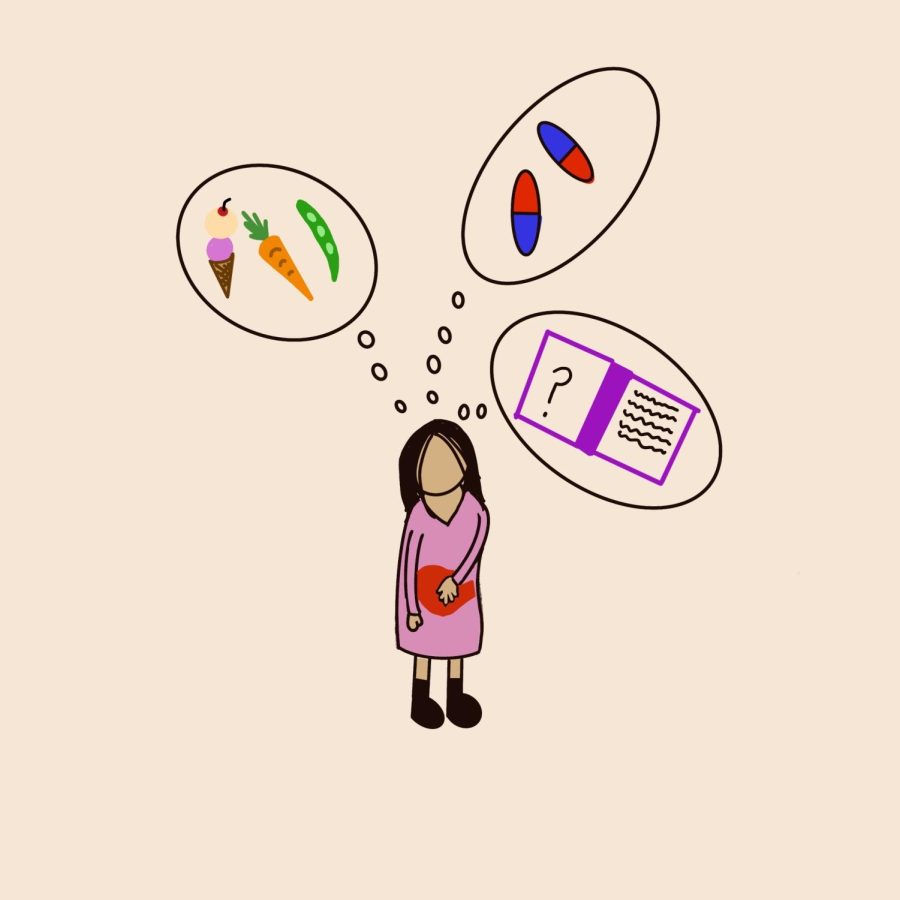Lezaic: Accommodate Students with PMDD
(Design by Brenda Payan-Medina | The Daily Utah Chronicle)
February 12, 2023
Believe it or not, periods can destroy lives. Conditions like Premenstrual Dysphoric Disorder can throw your entire life into disarray with little support from schools or employers.
For college students who already lead stressful lives, dealing with PMDD poses additional challenges that none of us are equipped for. The burden falls on us to equip ourselves by using existing (albeit limited) resources, advocating for ourselves and changing the attitude our culture holds towards menstruation.
The Torturous Reality of PMDD
People tend to misrepresent PMDD as another term for premenstrual syndrome. While PMS is inconvenient and troubling, its effects are milder and much more common. According to the International Association of Premenstrual Disorders, PMDD affects approximately 5.5% of people of reproductive age who menstruate. It is characterized by a wide range of extreme symptoms, most commonly depression, anxiety, mood swings and fatigue.
Dr. Brett Buchert, creator of the Me v PMDD Symptom Tracker app, is one of many people to experience incapacitating symptoms. When sharing her experiences with PMDD as a college student to Student Caffé Blog, she described the condition as, “The symptoms we experience in the premenstrual time (luteal phase) [becoming] so severe that they interfere with our relationships, work or school and overall quality of life.”
Her story resonated with me and many other college students with PMDD, who often feel lost and isolated by our shared struggle.
“I’d forget who I was during these times of sadness, what mattered to me, why I was even carrying on,” she told the blog. “It felt like deep inescapable pain in my core. And then sometimes I’d feel much better. Happy. Bounding to class thinking about my big and wide future. A week later I’d crash. Repeat.”
Replacing Hustle Culture with Empathy
In college, PMDD creates a constant battle for stability. If you fall behind even a little, the rest of the semester demands an endless game of catch-up. This rings truer for students with PMDD, who can feel out of commission for one or two weeks out of each month.
When my PMDD was at its worst, the anxiety was never-ending. I spent the week before my period in some of the worst emotional states of my life. Depression, fatigue and anxiety caused me to skip classes, miss deadlines and isolate myself. I spent the following week in physical pain. By the third, I was still recovering mentally and physically. I felt somewhat okay one week per month, but dread for my next cycle made it difficult to even enjoy that. All this repeated every month while balancing a full-time student schedule, a part-time job and living through arguably the worst political turmoil of our generation. Those of us with PMDD experience this, yet we’re expected to take it in stride.
But it doesn’t have to be this way. If we can dismantle the incessant push for productivity and hustle culture, we could create room for menstruators to live within their bodies as needed. We need to build a larger understanding of menstruation in our society and cultivate empathy for menstruators.
Expanding Sex Education
Sex education curriculums in the U.S. are insufficient at best. Utah has especially troubling sex-ed standards and continuously seeks to make them more restrictive. Paired with a dominant puritanical culture that treats our bodies as dirty and sinful, Utahns don’t have the best understanding of their bodies.
It takes a while to realize you have PMDD. Periods can be unpredictable under usual circumstances. Growing up, we were barely taught about periods, let alone PMDD. We’re taught to put our periods in the back of our minds and prioritize going about our days as expected of us. When life moves so fast, especially for college students juggling a million responsibilities at once, it’s difficult to track the patterns of PMDD.
This means people with PMDD face an added layer of obstacles. We learn to brush aside our pain, mute our body’s signals and categorize our experiences as normal, even if they’re not.
People who menstruate already don’t get taken seriously. PMS — not to be confused with PMDD — gets brushed off as an annoying outburst of hormone-fueled emotion. Compounded with the stigma surrounding depression and anxiety, people with PMDD find themselves at an impasse. When seeking help from authoritative figures like doctors and school counselors, describing their experiences with any mention of their menstrual cycle makes it likely they’ll get dismissed. Menstruators of color are even more likely to be ignored.
To battle the lack of care for PMDD, we must take on many issues at once. For starters, understanding PMDD means bettering our state’s sex education. It also means adding comprehensive and intersectional policies to schools, hospitals and places of employment that understand different bodies have different needs. We need to create a culture that prioritizes people over productivity. Last, but definitely not least, we need to support each other because the state will never do it for us. Share information, build networks and deconstruct Utah’s purity culture.
If you are struggling with PMDD, visit iapmd.org and viciouscyclepmdd.com for more information and resources on how to navigate your education or life with PMDD in general.









